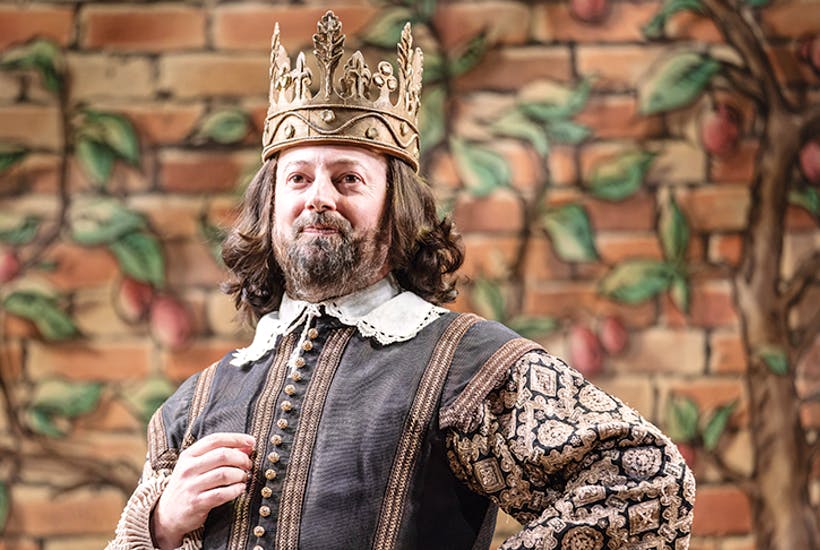A Moorish princess shipwrecked on the English coast disguises herself as a boy to protect her virtue. Arriving in London, she’s hired by William Shakespeare as an assistant to his maidservant Kate, who instantly falls in love with the exotic cross-dressing newcomer. This absurdity, familiar to fans of Twelfth Night, is the opening move in Ben Elton’s exquisite Shakespearean remix, The Upstart Crow.
It’s 1604 and the Bard is in poor creative form. ‘I have banged out a few clunkers of late,’ he admits, referring to Measure for Measure and All’s Well That Ends Well. ‘Should have been All’s Well That Ends Crap,’ suggests a lackey. Enter a Puritan who denounces drama as an ungodly art while slapping himself across the face to purge his soul of sinful thoughts. This gives Shakespeare an idea. He will ‘Malvolio’ the Puritan and send him a fake love letter purporting to come from Kate. Meanwhile Kate’s affair with the disguised princess is compounded by the arrival of the princess’s twin brother, also shipwrecked on the English coast, who has dressed himself as a girl.
The elevated silliness of Elton’s many-layered plot is superbly handled. This is comedy gold
The elevated silliness of Elton’s many-layered plot is superbly handled. He steals key elements from classic plays and welds them on to the known facts of Shakespeare’s life. His two daughters, Susanna and Judith, arrive from Stratford and are forced to pledge their affection for their father in order to secure a portion of his estate. Maidservant Kate plays the role of Cordelia in this affectionate King Lear spoof. Elton is clearly a formidable Shakespearean scholar and he delights in satirising Jacobean English which was more thickly laden with Anglo-Saxon than the language we use today. ‘Tufting-mufflers,’ and ‘cockling-pouches’ are his coinages for human genitalia. He calls homosexuals ‘gaysome hugger-tuggers’. The dreaded Puritans, who want to close every theatre in the land, are ‘God-prodding pure-titties’. ‘Futtocking’ is an all-purpose intensifier which sounds both obscene and harmless.
The show is enlivened by Steve Speirs who plays Richard Burbage as a fruity, preening thesp, like Charles Laughton in the bath. Every syllable drips with oil and suds. Danielle Phillips and Helen Monks are superb as Shakespeare’s daughters, who smoke clay pipes and use distorted Brummie accents (‘you’ rhyming with ‘thou’). David Mitchell’s Shakespeare is a mixture of egoism, uncertainty, fun-loving mischief and Pooterish irascibility. ‘I’m not bald, I have shy hair,’ he mooches defensively. He follows the script effortlessly as it passes between the Jacobean era and the present day. His comedy-rap exit line — ‘who da Bard? Me da Bard!’ — might easily have fallen flat. Mitchell’s amused cynicism makes it soar. If you’re taking your kids to this show, and I can’t recommend it highly enough, give them a forward briefing on the plots of Twelfth Night, King Lear and Othello. A short lesson on Shakespeare’s family (his two daughters and the early death of his only son, Hamnet) would be a useful addition. This is comedy gold.
Margaret Perry is a rising wunderkind from Cork. Her first play, Porcelain, was plucked from the slush pile at the Abbey Theatre and given a full production. That doesn’t happen very often. Her latest, Collapsible, arrives at the Bush in west London tinkling with gongs from the Dublin fringe, the Vault Festival and Edinburgh 2019.
The show is a monologue spoken by Essie (Breffni Holahan), a young Dubliner in need of a job. To complete her CV she canvasses friends and family for adjectives that describe her character. ‘Smart’ and ‘personable’, suggest her parents. ‘Militant perfectionist’, says an ex-boyfriend. Essie sits in her bedroom hunched over the internet, occasionally venturing out to meet potential employers. She has to endure the fake chumminess of hipster bosses who sprawl on bean bags pretending that the job interview is just a chat with a new friend. As her applications are rejected she gets more engrossed in the web and comes close to mental collapse.
Though the piece is verbally rich, it’s a little bedazzled by its own virtuosity. And the storyline — jobless yuppie seeks position in Dublin — is hardly the stuff of great drama. Very basic questions go unanswered. Who is the real Essie? How will her quest alter her? Who does she care about, apart from herself? She mentions Mum and Dad but only in passing. Her lovers, or former lovers, are Hayley and Derek. Is she still with them? Is she gay, bisexual, experimenting?
The show ends with some kind of reconciliation and the arrival of a second performer, which mars the purity of the piece as a solo effort. The writing and the observations are good but I wasn’t convinced they belong in a drama. Essie notices a patch of exposed brickwork. ‘I know how that feels.’ A line for a novel maybe. To me this felt like an interesting but overpraised dud. However the run has just been extended. So what do I know?







Comments